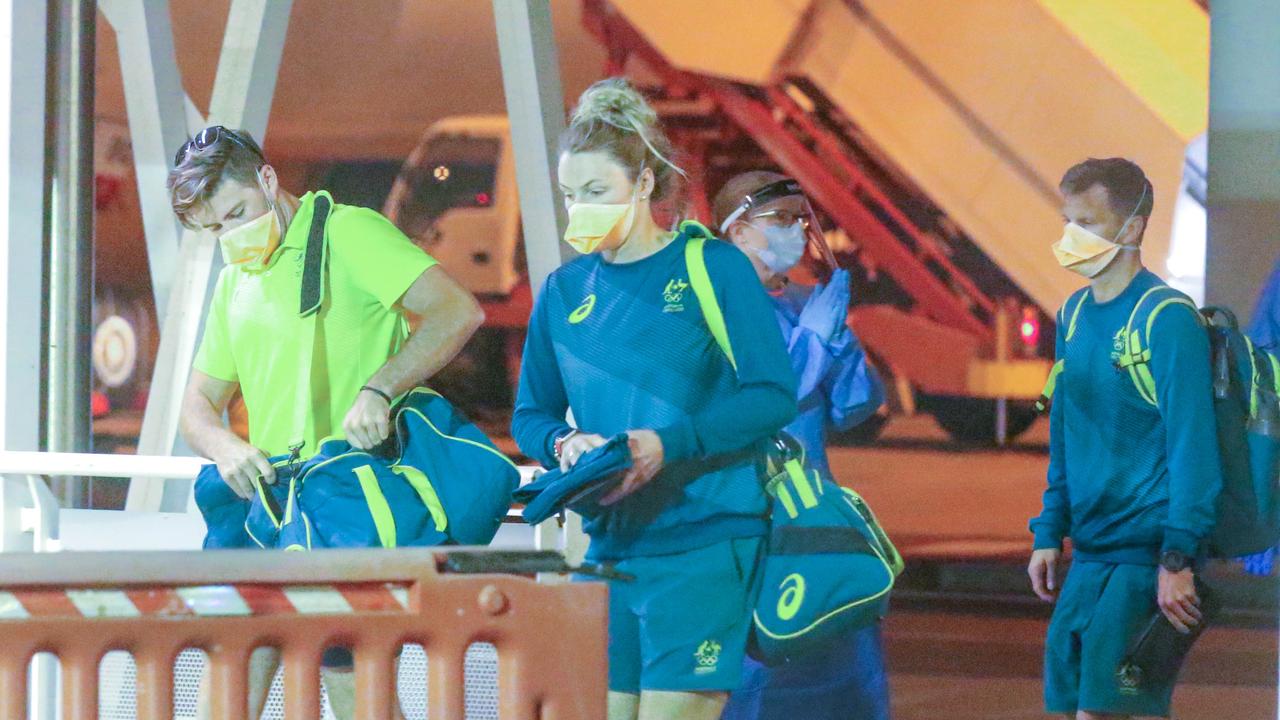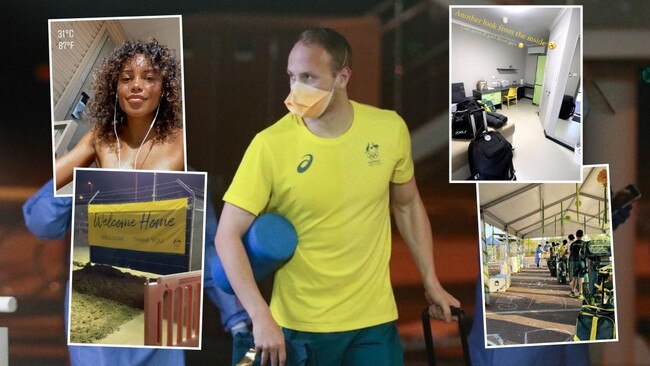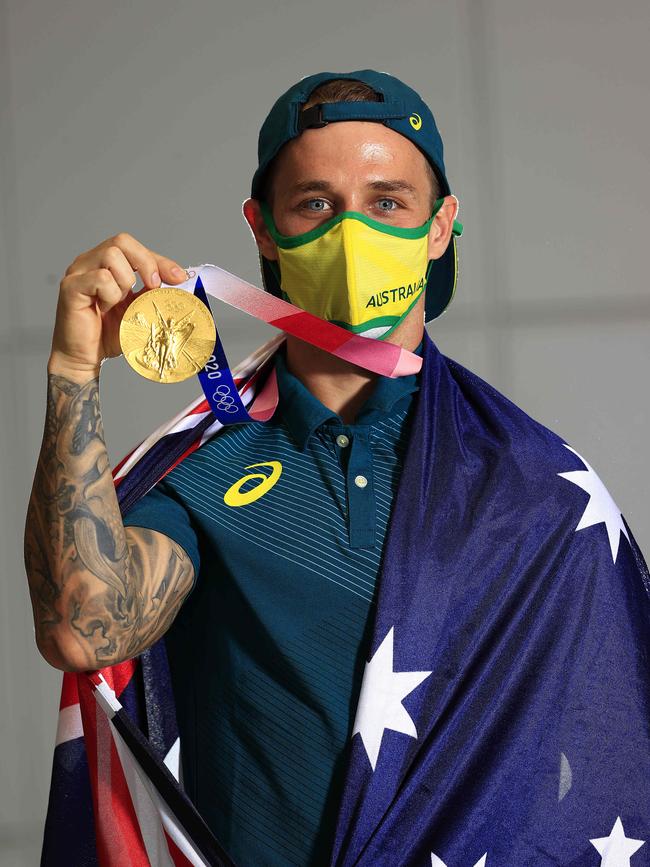Tokyo Olympics 2021: Inside Australia’s Northern Territory quarantine hub
Australia’s record-breaking Olympians are now contending with the reality of quarantine in the Top End, where some odd activities have been planned in a bid to stave off boredom.

The celebrations have been put on hold abruptly for the first fleet of Australia’s record-breaking Olympians, who have already been separated from their teammates and placed in isolation after arriving home under the cover of darkness.
It’s a change of pace from the last few nights in Tokyo, when several Aussie athletes went on a bender in the Olympic village, with some getting so drunk that they earned reprimands for trashing their rooms and vomiting on floors.
The entire team has since been warned they need to be on their best behaviour during their mandatory two-week quarantine stint in the Northern Territory.

And if they didn’t get the memo the first time, they certainly did the moment they landed and the reality of life under lockdown was rammed home.
There was no welcome home party when the first charter flight from Tokyo touched down in Darwin before sunrise.
There were 115 team members on board - including rowers, the women’s rugby team, BMX riders and the champion swimmers who have thrilled the nation with their stunning performances in the pool.


But the only people waiting for them were masked officials, taking their temperatures and checking their paperwork.
Everyone on board the jumbo was immediately whisked away by bus to the old workers’ camp at Howard Springs, about 20 minutes from Darwin, which will be their home for the next 14 days.
Each member will have their own separate apartment and are under strict orders not to mingle with anyone else, including their teammates.
“Our number one priority is always the safety and wellbeing of our team members, and this is just as important while they are in quarantine,” Australian Olympic Committee services manager Daniel Kowalski said.
“They will have around-the-clock access to a mental health referral network run in conjunction with the Australian Institute of Sport, both during and after quarantine as required.”
The AOC has arranged a series of optional online activities to try and keep everyone sane, including entertainment, physical activity sessions, talks by various experts on everything on how to manage quarantine, to financial advice, music sessions, trivia competition and how to improve your social media skills.

But the one activity that is not negotiable is the ban on partying, with everyone at the facility under guarded supervision.
Drinking alcohol is strictly prohibited, along with all forms of physical contact, including outdoor exercise. Team members will receive three meals a day, delivered to their apartments, but can order groceries from the nearby supermarket if they’re feeling peckish.
It’s understood the team’s corporate sponsors are preparing gift bags for everyone returning home, which will be staggered during the next week, depending on when their events finish.
Quarantine ‘reward’ for Australia’s gold medal hero
When the two weeks of mandatory quarantine for Australia’s Olympians gets too lonely, BMX star Logan Martin has a souvenir from Japan that he reckons will help him get through the worst moments.
He reckons he will spend hours just staring at his Tokyo gold medal.
The daredevil BMX rider is one of the few Australian Olympians who has already been through the mind-numbing torment of quarantine after he only recently returned home from the world championships, so he knows exactly what to expect - and it ain’t a lot of fun.
“I sort of have a little bit of experience,” he said.
“I don’t think I can get a worse room than I did (before). I literally had a little shoebox with a window that didn’t open.

“I don’t think I need to work out as hard as I was previously. I don’t have an Olympic Games to prepare for, so I’m just enjoying a bit of downtime.
“I don’t like sitting still, but I will and just embrace it. It’s something we have to prepare for.”
That was about two months ago, when he was still in heavy training for Tokyo, but things have changed a lot for Martin since then.
As a member of what could possibly turn out to be the best Australian team ever, he’s expecting a bigger-sized room when he gets home from Tokyo.
And if he ever gets too bored, he has a new friend to keep him company and remind him it was worth all the trouble.
“Obviously it’s a lot easier going to hotel quarantine with an Olympic gold medal to look at every day,” he said. “So I’ll just figure it out.”
Martin is among the first batch of Australian gold medallists from the Tokyo Olympics coming home – but don’t expect to see him or any of our inspirational swimmers any time soon.
At any other period in history, our Olympic champions would have been welcomed home with open arms from the moment they touched down, reuniting with family at the airport, and then being cheered by thousands of people in ticker-tape parades strewn across this country.

But not this time, thanks to Covid-19 and the strict quarantine rules in place for everyone coming home, including the Olympic team.
When the first charter flight gets home on Tuesday, the occupants will all be going into a fortnight of quarantine at Howard Springs in the Northern Territory.
It’s a far cry from the adrenaline rush of winning gold at the Olympics, but the team’s chef de mission Ian Chesterman said everyone had accepted that was part of the deal.
“Everyone totally understands that we’ve been fortunate to come over here and have this opportunity, and we’re delighted in the fact that we’ve provided so much joy to people,” he said.
“But I think we also understand that we have to play our role and go back into quarantine to make sure when we are released back into the community we’re safe and they’re safe.”
Howard Springs may sound like a fancy resort, but the government-run quarantine facility just outside of Darwin is a far cry from the bright lights of Tokyo. Returning athletes will have a balcony to at least get some fresh air, but they will be restricted to their own unit and prevented from going outside. They will get three delivered meals a day, but alcohol is banned, so there will be no parties or celebrations.
Aussie swim queen Cate Campbell said she was planning to watch the second week of the Olympics on television before trying out some new exercise routines.
“I’m going to have to be a little bit creative during lockdown,” she said.
“I downloaded Chris Hemsworth’s app and so I might do a few workouts with it.”
Emma McKeon, who won a record seven medals in Tokyo, joked that Campbell may emerge from quarantine looking like Thor, while she wanted to use her own time to try and come to terms with what she had achieved.
“It’s been a bit of a whirlwind, so I think it will give us a chance to just relax for a bit and soak it all up,” she said.
“I really haven’t had a chance to watch much of the other sports. so I’m excited to watch some of those on TV as well.”
Veteran backstroker Emily Seebohm has a novel way to get through it. Like Campbell, she is a 19-year, four-time Olympian, and is going home with another gold medal in her baggage.
She’s dyed her hair for the trip, saying if she doesn’t like the colour it won’t matter because it’ll go back to its natural hue by the time she’s out.
“I might sleep through the entire two weeks,” she said. “It’s an amazing opportunity, being in quarantine and the Olympics still being on, so I can’t wait to watch the Aussies do what they do.”
Zac Stubblety-Cook, the only male swimmer to win gold after his surprise breakthrough in the 200m breaststroke, reckons the two weeks in quarantine could be a blessing in disguise to prepare for the reception awaiting them all once they got out.
“This is an opportunity to take a breath first,” he said. “I’ll catch up with family and friends eventually.”
Ariarne Titmus, who won two gold medals after twice beating American superstar Katie Ledecky, is expected to earn up to $4m in sponsorship as one of the country’s most marketable stars. But she is in no rush to start thinking about any deals.
“I’ll definitely be sleeping and watching the Olympics, but then I’ve got other things to keep me occupied,” she said.
“I’ve got some colouring in, I’ve got nail polish and that type of thing. So hopefully that can keep me going for two weeks.”
The Australian Olympic Committee has already devised a series of plans to help athletes pass the time and stay mentally and physically fit while confined to their apartments.
“They have something each day that they can engage with, we have some opt-in things as well but obviously virtual,” Australia’s head swimming coach Rohan Taylor said.
“The key thing is having a daily routine.”







To join the conversation, please log in. Don't have an account? Register
Join the conversation, you are commenting as Logout